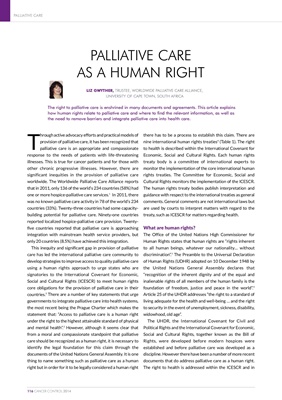
2000 the UN Committee on Economic, Social and Cultural
Rights adopted General Comment 14 which includes the
statement that: "States are under the obligation to respect
the right to health by, inter alia, refraining from denying or
limiting equal access for all persons, … to preventive, curative
and palliative health services".7
A further source of validation of palliative care as a human
right comes from the infrastructure of the UN which appoints
Special Rapporteurs to advance international understanding
of how to achieve the realization of certain rights. The Special
Rapporteur on the Right to Health and the Special
Rapporteurs on torture and other cruel, inhuman or degrading
treatment or punishment have both made key statements on
the importance of palliative care and pain relief:
"Many other right-to-health issues need urgent attention,
such as palliative care … Every year millions suffer horrific,
avoidable pain … Palliative care needs greater attention"
(2008).8
"The failure to ensure access to controlled medicines for
the relief of pain and suffering threatens fundamental rights
to health and to protection against cruel inhuman and
degrading treatment. International human rights law
requires that governments must provide essential medicines
- which include, among others, opioid analgesics - as part of
their minimum core obligations under the right to health…
Lack of access to essential medicines, including for pain relief,
is a global human rights issue and must be addressed
forcefully…" (2008).9
In February 2013, Juan E Méndez, the current UN Special
Rapporteur on torture and other cruel, inhuman or degrading
treatment or punishment presented a report to the UN
Human Rights Council on Torture in Health Care Settings.
The report focused on "certain forms of abuses in health care
settings that may cross a threshold of mistreatment that is
tantamount to torture or cruel, inhuman or degrading
treatment or punishment".
Within the report Mr Méndez describes issues relating to
PALLIATIVE CARE
CANCER CONTROL 2014 117
Level 1: Not known activity
Level 2: Capacity building
Level 4a: Preliminary integration
Level 4b: Advanced integration
Level 3a: Isolated provision
Level 3b: Generalized provision
Level 1: Not applicable
GREECE
ALBANIA
FINLAND
AUSTRIA
ITALY
SPAIN
SWEDEN
NORWAY
GERMANY
FRANCE
PORTUGAL
HUNGARYROMANIA
BULGARIA
DENMARK
POLAND
BELARUS
UKRAINE
CZECH REPUBLIC
SLOVAKIA
NETH.
BELGIUM
IRELAND
REP. MOLDOVA
LITHUANIA
LATVIA
ESTONIA
LUX.
MONTENEGRO
BOSNIA AND
HERZEGOVINA
CROATIA
SLOVENIA
SWITZ.
F.Y.R. MACEDONIA
ICELAND
U. K.
MONACO
RUSSIAN
FED.
LIECHT.
RUSSIAN FEDERATION
TURKEY
CYPRUS
GREENLAND
UNITED STATES OF AMERICA
CANADA
MEXICO
THE BAHAMAS
CUBA
PANAMA
EL SALVADOR
GUATEMALA
BELIZE
HONDURAS
NICARAGUA
COSTA RICA JAMAICA
HAITI
DOM. REP.
ARGENTINA
BOLIVIA
COLOMBIA VENEZUELA
PERU
BRAZIL
FRENCH GUIANA
SURINAME
GUYANA
CHILE
ECUADOR
PARAGUAY
URUGUAY
KENYA
ETHIOPIA
ERITREA
SUDAN
EGYPT
NIGER
MAURITANIA
MALI
NIGERIA
SOMALIA
NAMIBIA
LIBYA
CHAD
SOUTH AFRICA
UNITED REP.
TANZANIA
DEMOCRATIC
REPUBLIC OF
CONGO
ANGOLA
ALGERIA
MADAGASCAR
MOZAMBIQUE
BOTSWANA
ZAMBIA
GABON
CENTRAL AFRICAN
REPUBLIC
TUNISIA
MOROCCO
UGANDA
SWAZILAND
LESOTHO
MALAWI
BURUNDI
RWANDA
TOGO
BENIN
GHANA
CÔTE
D'IVOIRE
LIBERIA
SIERRA LEONE
GUINEA
BURKINA
GAMBIA
CAMEROON
SAO TOME & PRINCIPE
ZIMBABWE
REPUBLIC OF
CONGO
EQUATORIAL GUINEA
WESTERN
SAHARA
DJIBOUTI
SENEGAL
GUINEA BISSAU
Canary Islands JORDAN
ISRAEL
LEBANON
ARMENIA AZERBAIJAN
GEORGIA
KYRGYZSTAN
TAJIKISTAN
KUWAIT
QATAR
U. A. E.
YEMEN
SYRIAN
ARAB
REPUBLIC IRAQ ISLAMIC REP.
IRAN OMAN
SAUDI ARABIA
AFGHANISTAN
PAKISTAN
INDIA
CHINA
KAZAKHSTAN
TURKMENISTAN UZBEKISTAN
MYANMAR THAILAND
CAMBODIA
NEPAL
BHUTAN
VIETNAM
SRI LANKA
LAOS PEOPLE'S
DEM. REP.
BANGLADESH
MALAYSIA
PAPUA
NEW GUINEA
BRUNEI
PHILIPPINES
TAITT WANWW
INDONESIA JAPAN
MONGOLIA
REPUBLIC OF
KOREA
D.P.R. KOREA
AUSTRALIA
NEW ZEALAND
NEW CALEDONIA
FIJI
COMOROS
BAHRAIN
MALDIVES
SEYCHELLES
TIMOR LESTE
TRINIDAD & TOBAGO
CAPE VERDE
MAURITIUS
MARSHALL ISLANDS
GRENADA
BARBADOS
MARTINIQUE
SAMOA
SOLOMON ISLANDS
MALTA
SINGAPORE
SERBIA
SOUTH
SUDAN
Figure 1: Mapping levels of palliative care development
Table 1: International Human Rights Treaties
‰ International Convention on the Elimination of All Forms of
Racial Discrimination (ICERD)
‰ International Covenant on Civil and Political Rights (ICCPR)
‰ International Covenant on Economic, Social and Cultural
Rights (ICESCR)
‰ Convention on the Elimination of All Forms of
Discrimination against Women (CEDAW)
‰ Convention against Torture and Other Cruel, Inhuman or
Degrading Treatment or Punishment (CAT)
‰ Convention on the Rights of the Child (CRC)
‰ International Convention on the Protection of the Rights of
All Migrant Workers and Members of Their Families
(ICRMW)
‰ International Convention for the Protection of All Persons
from Enforced Disappearance (CPED)
‰ Convention on the Rights of Persons with Disabilities (CRPD)
Source: http://www.ohchr.org/en/professionalinterest/pages/coreinstruments.aspx